For many, coffee is more than just a morning ritual—it’s a way to savor the moment and delight in every sip. With the increasing awareness of health and sustainability, organic coffee has become a popular choice. But how do you choose the best organic coffee for your palate? This guide will walk you through the essentials to help you make the best pick and enjoy every cup to its fullest.
Understanding Organic Coffee: What Makes It Special?
Organic coffee is grown without synthetic fertilizers or pesticides, resulting in a product that’s better for the planet and your health. This section explores the benefits of choosing organic and how these practices affect the coffee you drink.
The essence of organic coffee lies not just in its cultivation, but in its connection to environmental stewardship. When farmers grow coffee organically, they enrich the soil and preserve crucial ecosystems. This means that each cup of organic coffee you enjoy contributes to a healthier Earth, making your morning ritual an act of condescension.
Moreover, consuming organic coffee has a variety of advantages for your body. Many enthusiasts claim that organic coffee tends to be lower in acidity, making it easier on the stomach. Additionally, organic beans retain more antioxidants compared to conventionally grown ones. This supports the notion that you’re not just drinking coffee; you’re nourishing your body with every sip.
How to Identify Quality Organic Coffee
Not all organic coffees are created equal. To enjoy the full experience, it’s important to become savvy about what to look for when choosing your beans. Start by examining the labels. Look for certifications such as the USDA Organic seal, which guarantees that the coffee was grown without harmful chemicals.
Next, freshness plays a vital role in determining the quality of your organic coffee. Seek out roasters who include roast dates on their packaging. Ideally, you want to buy coffee that has been roasted within the last few weeks. Freshly roasted beans will yield a richer flavor and an invigorating aroma.
Don’t forget to consider the origin of the beans. Different regions produce distinct flavors and qualities. Research farms in renowned coffee-producing countries to find products that suit your taste. For example, Ethiopian coffees are known for their fruity and floral notes, whereas Sumatra beans offer a deeper, earthier profile.
Flavor Profiles: Discovering Your Perfect Brew
From fruity and floral to bold and nutty, organic coffees come in various flavor profiles. This section helps you understand the tasting notes and regions that can guide you to your favorite brew. But what does this all mean? Essentially, flavor profiles are influenced by several factors including the coffee’s origin, processing method, and even the altitude at which the coffee is grown.
If you’re new to tasting coffee, it might help to think of flavors in terms of descriptors. A coffee that is bright and zesty could remind you of citrus fruits, while one that’s smooth and chocolaty might evoke comforting feelings reminiscent of cozy desserts. Explore different roasts; light roasts generally emphasize fruity notes, while darker roasts often present smoky undertones.
As you embark on this flavor journey, consider hosting a tasting party with friends. Comparing different organic coffees side by side can be a fun and educational experience. Write down the tasting notes you discover; soon, you’ll develop a palate that will not only enhance your coffee-drinking journey but also help guide your future purchases.
Exploring Brewing Methods for the Best Taste
Your brewing method can significantly impact the flavor of your coffee. Discover various methods—like French press, pour-over, and espresso—and how each can bring out different nuances in your organic coffee. For example, a French press allows the coffee’s oils and fine particles to remain in your cup, enhancing its body and depth.
On the other hand, a pour-over method enables more control over the brewing time and water temperature, resulting in a clean cup that highlights the unique flavors of the beans. Experimenting with grind size and water-to-coffee ratios can make all the difference in achieving your ideal brew.
Don’t forget the classic espresso! This method delivers a concentrated shot of coffee, ideal for those who enjoy a strong and flavorful experience. Additionally, you can use espresso as the foundation for various beverages such as lattes or Americanos. Regardless of your preference, there’s a brewing method that will enhance the delightful characteristics of your organic coffee.
Where to Buy High-Quality Organic Coffee
From local roasteries to online subscriptions, find out the best places to purchase organic coffee. This section includes tips for identifying reputable brands and maximizing your purchase. One fantastic option is to visit your local farmer’s market, where you can often find fresh, locally roasted organic coffee beans.
Additionally, consider supporting smaller, independent coffee companies that prioritize ethical sourcing and quality. They often have a passion for their product and can provide you with detailed information about the beans you’re purchasing. When shopping online, read reviews and look for brands that offer transparency regarding their sourcing and roasting practices.
Finally, don’t overlook the power of subscriptions. Many coffee roasters now offer subscription services that deliver fresh organic coffee right to your doorstep, often allowing you to explore various blends and origins. This not only enhances your coffee experience but also ensures you have a constant supply of delightful brews to enjoy.
Wrapping Up Your Organic Coffee Journey
Choosing organic coffee is not just about taste; it’s about making a choice that benefits your health and the environment. By considering factors like sourcing, flavor profiles, and sustainable practices, you can ensure that every sip is not only delightful but also responsible. So next time you brew a cup, remember that the best organic coffee is waiting for you to explore its rich world of flavors.


